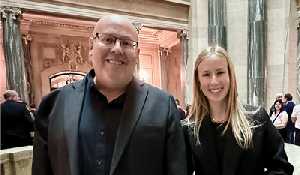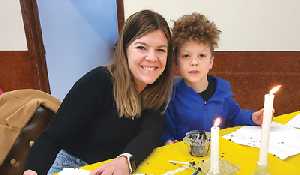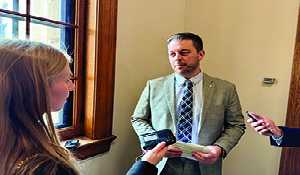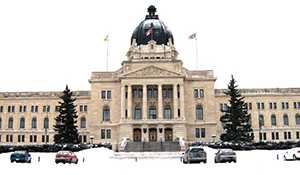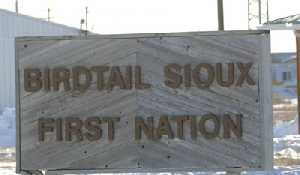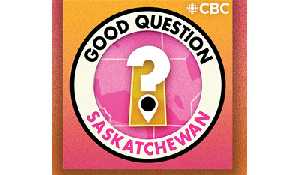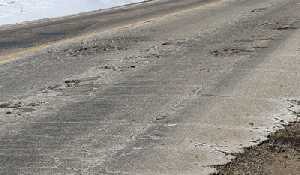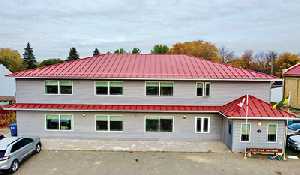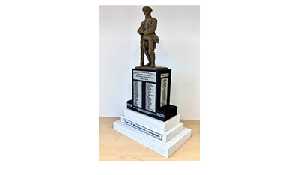Cheveldayoff says Sask Party must appeal to urban and rural voters
December 9, 2017, 10:15 am
Kevin Weedmark
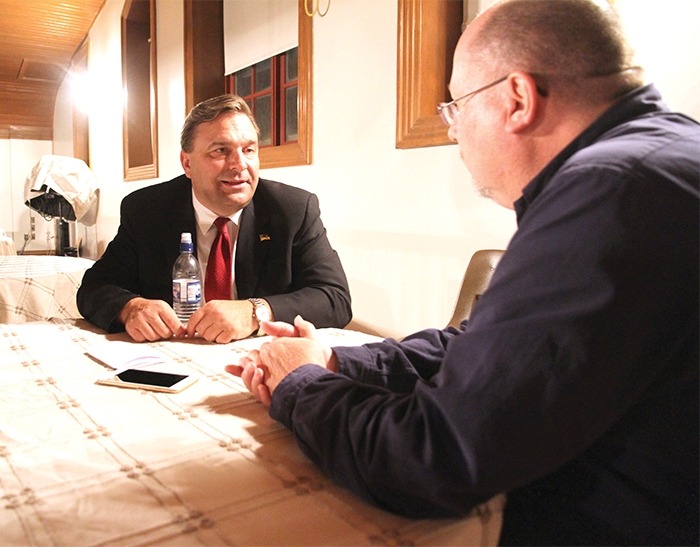

Ken Cheveldayoff is one of six candidates to be the leader of the Saskatchewan Party and the next premier of Saskatchewan. Editor Kevin Weedmark sat down with him for an interview at the Moosomin Saskatchewan Party Constituency Association leadership forum in Wolseley Wednesday.
Tell me a little bit about your background and why you got into politics in the first place?
I grew up in rural Saskatchewan in a little town called Blaine Lake, just north of Saskatoon.
John Diefenbaker was our member of parliament so he came to our school by helicopter and I would be the first kid out there in the schoolyard to meet him and I would be so excited to see him that I would run to the back of the line so I could shake his hand again.
I guess that’s what first gave me the spark regarding politics and public service in the province.
I went to university with Brad Wall and we talked about the opportunity to serve our province at some time in our future and I’ve been fortunate to serve as a cabinet minister in his government for the last ten years.
Why did you decide to throw your hat in the ring for leadership?
I’ve got the experience and the background. I grew up in rural Saskatchewan.
I represent a strong urban constituency and I’ve had elected experience as a cabinet minister and I think those three things are essential for the next premier going forward along with the passion and the vision for the future of the province.
I believe I have all of that. I talked to my family and they were very supportive so I just threw my hat into the ring and I feel like I have a lot to offer as the next premier of Saskatchewan if the people feel the same.
What experience and skills specifically do you think will help you with the premier’s job?
I think I have the ability to organize, to bring people together.
I think I am a fairly good communicator. I have the opportunity to speak to people and lead in that regard.
I am a consensus builder, somebody who can bring people of different views together and help them work towards the same goal. I think that’s what is going to be needed in the future. Somebody who can bring the 46 Sask Party MLAs together and lead them into the 2020 election which I think is going to be so important.
What do you think differentiates you from the other candidates?
It is that rural experience, that growing up in rural Saskatchewan, the living in a small town, knowing the challenges and also the benefits, having that urban strength.
When I was first elected I won by 595 votes and in the last election I won by almost 5,000 votes because of the team around me.
I know how to win in urban Saskatchewan. I think the ballot question is going to be who can win in 2020? Who can win the rural but also who can win the urban seats and who has the elected experience.
I think that elected experience is essential going forward and I think ten years of that experience is just the right amount.
What do you think the biggest challenge is that the next premier will face?
We have had 10 years of growth with premier Wall and I think what we have to look forward to is another ten years of growth so we have to look at the budget, acknowledge that there have been some mistakes that have been made, some things that we could do better, fix those and then look forward to another 10 years of growth.
I am a fiscal conservative. I believe that if every family and business has to balance their books, so too should the government of Saskatchewan.
I believe in balancing that budget in the next two years. I don’t believe in watering that down at all.
I think we will reap the benefits of it because the people with capital will be looking at who has their fiscal house in order. If that is Saskatchewan I think we will benefit from that going forward.
How big of a job is it going to be for the next premier to live up to Brad Wall’s example ?
I always say no one is ever going to fill Brad Wall’s shoes. He will go down in history as one of the best premiers ever in the history of the province. But somebody has got to take the torch from him and run with it and make it shine bright again and I think I have the rural background, the urban background, the elected experience to do that, so I think that is what differentiates me and I think that is what will put me forward as the best candidate.
How do you run a campaign like this? Is it a matter of trying to get around to every small community?
You go with your instincts, you go with the number of days available and try to reach as many communities as you can, and there are certain limitations.
I am an elected member, I am a member of the legislature. I have been sitting in the legislature for the last six weeks, so that is a certain limitation, but really you get up in the morning and you go full out all day long, and what is really important is to have a good team around you, and I am so blessed to be able to have a good team of MLAs around me. But I really feel this next election, the leadership, it's not about the establishment or the establishment candidate, it’s not about endorsement, although I have a good number of MLAs endorsing me. I appreciate that, but it’s really about the grass roots people that are here.
Each and every person has one vote and that’s so important to get out and meet as many people and that’s why I have been very, very aggressively going to as many towns, villages, hamlets that I can and my policies reflect that. Like a 225 percent increase in rural internet services.
I was talking to people in Wolseley earlier today and they were saying ‘right on, that’s the policy that we want. We want to be able to have rural internet services.’
Also I am very concerned about marijuana, drugs and crime in our province and that is something that I have been talking about.
That is something I have been talking about with people across the province and I’m very concerned. We have to keep marijuana away from our schools, we have to keep it away from our businesses and we have to keep it away from our highways.
How do you measure your success in the campaign so far?
There have been a couple polls out that give you some indication of how things are going but really it’s a reaction you get from people when you meet them.
When people start calling you out of the blue and saying 'hey I read your policies, I’m with you,' then you really start to feel you're resonating out there with people you haven’t even met, and that’s what’s been happening in my campaign in the last little while.
I’m very pleased and very confident but I’m running like I’m five points behind because that’s the way I have always run a campaign and we just have to do a little bit more to be successful.
How do you measure success in this campaign. Is it a matter of if you are the next premier, and anything else is failure, or is there more to it than that?
There are no losers in this race. Every one of the candidates has met hundreds, maybe thousands of new people, they have honed their skills, they become better politicians, become better listeners. So I think each and every one of the six of us has developed and I credit my five good friends for taking this on.
It’s something where you have to put it all out there—your family, your whole person. There’s nothing else that you can focus on if you want to win for five or six months and that’s what I’ve done and that is what each of these colleagues that are friends of mine as well have done, and I credit them.
What have you learned personally through this process?
I’ve learned to be a better listener, to really understand what makes Saskatchewan people so proud.
How they have a real, intense feeling of pride in our province and how they want it to succeed.
How that pride has grown in the last ten years as our province has grown.
I think that’s why growth is the most important thing going forward. They want us to concentrate on healthcare, education and social services. That’s why we work hard to grow the economy, so we have more money to put into those.
They want us to be successful economically but they want us to have a social side as well.
They want prosperity for all.
When it comes to things like mental health and addictions and things like that they want us to be caring and understanding in that regard.
For example I’m proposing that we have a partnership with the Alberta Adolescent Recovery Centre for those people who have mental health issues and addictions issues that are falling through the cracks.
I don’t think we need to spend millions of dollars on replicating it here but those partnerships are so important.
Have you travelled a fair bit throughout the province for this campaign?
Oh yes. From Pinehouse in the north, right down to Eastend and Shaunovon in the southwest, Carlyle, Lampman, everywhere. I've put 30,000 km on my vehicle and it seems like you get an oil change every week.
What sort of things are you hearing, are the concerns the same around the province?
Pretty much the same. Balance the budget, be fiscally responsible, come up with some programs that increase our quality of life and who best to win in 2020. Who can win rural Saskatchewan and urban Saskatchewan.
I talk about the 2003 election—we had every rural seat in the province except one. We won three in urban Saskatchewan. It wasn’t enough. What we have to do is win more than a handful in Regina and Saskatoon.
We have to win Moose Jaw, Prince Albert and we have to win the rural of course.
The ballot question will be who best to be the Sask Party leader to win in rural and in urban Saskatchewan.
What does the Sask Party have to do to win that election?
We have to listen very close, have extraordinary campaigns, we have to have absolutely outstanding candidates, and that election has to begin on January 28, the day after the new leader is chosen and the new premier.
It is going to be very important to run government efficiently and demonstrate what we can do in government. It is going to be very important to run the party extraordinarily well also.
How much work goes into a campaign like this?
It is a tremendous amount of work.
You just get up in the morning, you go all day, and you make sure you have a good sleep, but you’re just buoyed by enthusiasm and adrenaline.
You come to places like Wolseley tonight, a beautiful hall, packed with people, so much enthusiasm, everybody just talking away and enjoying it, and they are so appreciative of the candidates coming out here and meeting everyone, so you feel that warmth and that enthusiasm, and that helps a little bit with the adrenaline going forward.

























